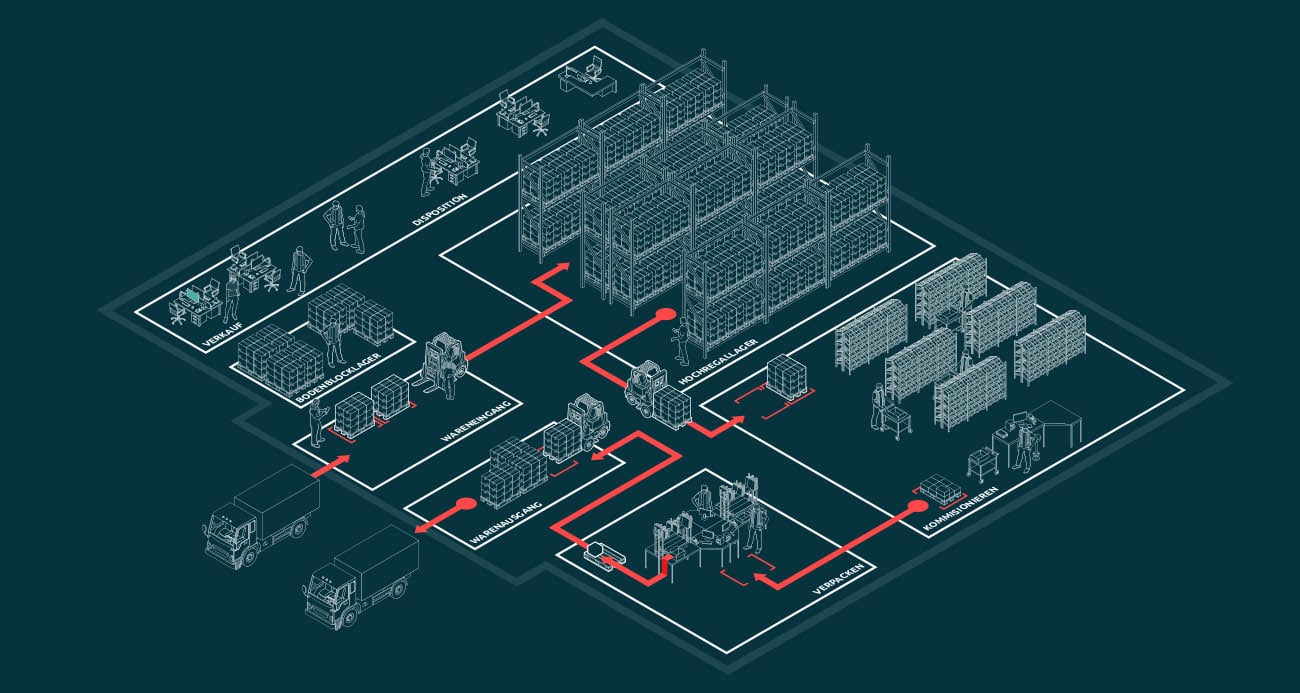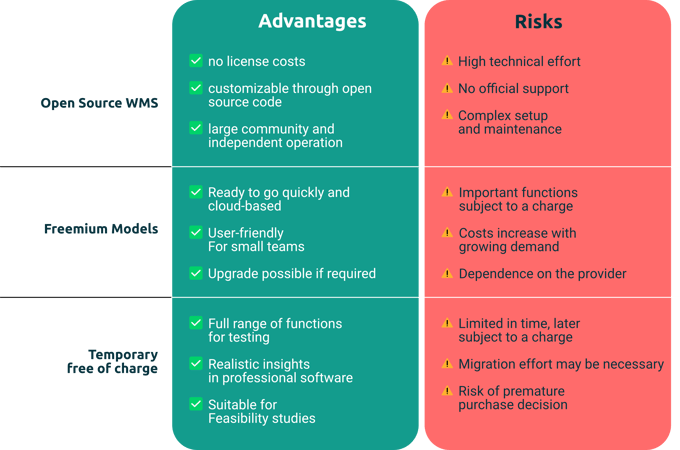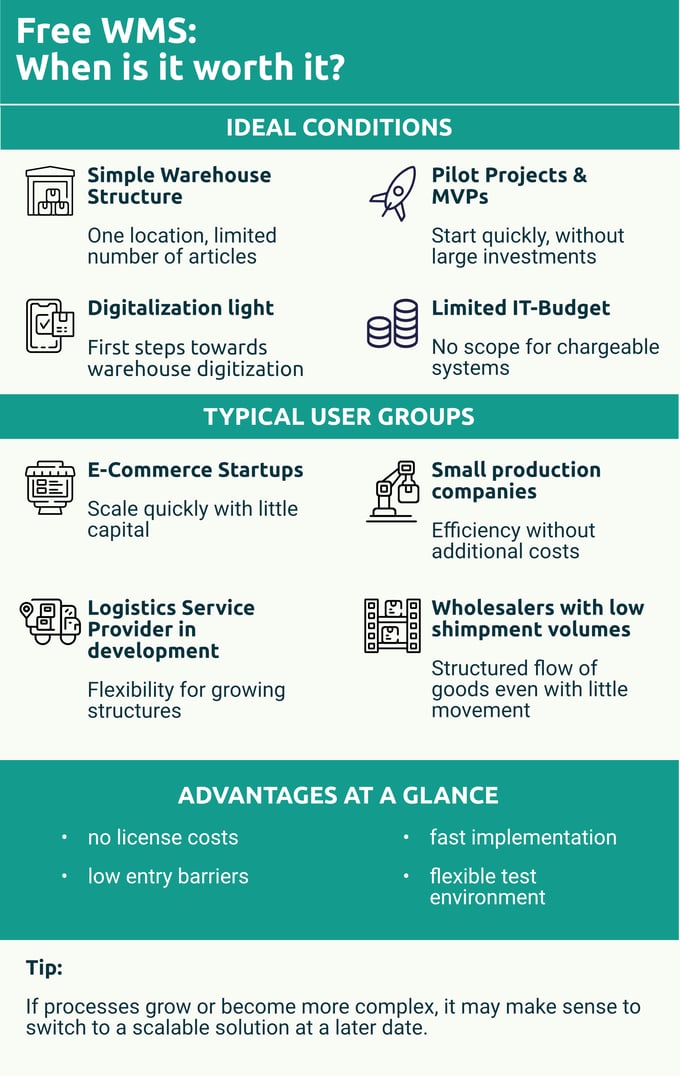### Update April 2025: ###
For start-ups and smaller companies from Germany, Austria and Switzerland, Bitergo now offers a fully-featured Warehouse Management System with Bitergo WMS Free, which can be used free of charge for up to 3 users for up to 3 years!
Learn more about the details and requirements here:
https://bitergo.com/bitergo-wms-free
Interested? Register for Bitergo WMS Free today! We will get back to you within 2 working days and, if all requirements are met, you can soon benefit from the advantages of digital warehouse management!
Free Warehouse Management Software: The key points in brief
- Free warehouse management software is particularly suitable for small and medium-sized businesses with limited budgets, as well as for startups.
- The range of features varies greatly – not all solutions are fully-fledged WMS systems.
- Data protection, scalability, and support are critical criteria when choosing a solution.
- A switch to a paid version becomes necessary as complexity, number of users, or automation requirements increase.
- Bitergo WMS Free is one of the few solutions offering full functionality and German-based servers.
1. Why free Warehouse Management Software is becoming increasingly attractive for Startups and SMEs
The demands on warehouse processes are increasing – even for startups and small to medium-sized enterprises (SMEs). At the same time, many companies hesitate to adopt professional WMS solutions because they:
- fear high one-time costs,
- lack internal resources,
- or want to avoid long-term commitments.
This is where free warehouse management software comes in: it offers a low-risk entry point to digitize processes and prepare for growth step by step.
2. What is Warehouse Management Software?
Warehouse management software (Warehouse Management System, or WMS for short) helps companies with:
The goal is to create transparency, avoid errors, and save time & costs – from small shipping warehouses to complex logistics centers.

Image: Classic topology of a warehouse
3. What Types of free WMS Solutions Are available?
Not all “free warehouse management software” is created equal. The following models are commonly found on the market:
| Model |
Description |
Example |
| Open Source |
Open-source solutions, typically self-hosted |
Odoo Community |
| Freemium |
Limited free version, paid upgrade required later |
Zoho Inventory, inFlow Inventory |
| Free for a Limited Time |
Trial version or promotional offer |
Many traditional ERP providers |
Advantages and Risks of the Different Systems at a Glance:

Bitergo WMS Free takes a special approach here. The warehouse management software offers the full range of features free of charge. The only limitation is a maximum of three users. The free period of 3 years is significantly longer than usual, allowing for a realistic test to see if the solution pays off in the long run.
4. Comparison of free Warehouse Management Software
The following table shows the differences between popular free systems – with a focus on possible limitations, features, data protection, and support:
| Provider |
Usage
Limit |
Feature
Set |
Data Protection /
Server Location |
Support |
| Bitergo WMS Free |
3 users, 3 years |
Full |
Germany |
2 hours / month included |
| Odoo Community |
Unlimited |
Part of ERP suite, requires configuration |
Depends on hosting |
Community forum only |
| Zoho Inventory |
1 user, 2 locations, 50 orders/month |
Fairly limited in free version |
Servers worldwide |
Self-service only |
| eSwap |
1 integration, 300 orders/month |
Significantly limited |
Server location not specified |
Email support |
| Sortly |
1 user, 100 items |
Limited |
Server location not specified |
Self-service |
| VARIO 8 |
1 user, 1,000 documents/year |
Limited |
Depends on hosting |
Email support |
Status: May 2025
💡Conclusion:
Most free solutions offer limited functionality or lack real warehouse management capabilities. Bitergo WMS Free is an exception – with full WMS functionality and data storage in Germany.
5. Opportunities: When do Companies benefit from a free Solution?
A free WMS solution is especially suitable for companies that:
- have low warehouse complexity (e.g., one warehouse location, limited number of items),
- want to take initial steps in digitalization,
- are setting up pilot projects or MVPs,
- have no IT budget for proprietary systems.
Typical Use Cases:
- Startups in e-commerce
- Small manufacturing companies
- Logistics service providers in the setup phase
- Wholesalers with low shipment volume

6. Risks and Limitations: When “free” gets expensive
Not every “free” software remains cost-effective in the long run. The following risks should therefore be considered:
- Data Risks:
Unclear hosting locations, insufficient protection of personal data.
- Limited Features:
No multi-warehouse support, no role-based access control, no integration with ERP/shop systems.
- Maintenance and Updates:
Open-source solutions require in-house IT expertise.
- Vendor Lock-in:
Subsequent price increases or feature restrictions are possible.
7. The right Time to switch to a paid Version
Free WMS systems reach their limits at the latest when:
- you want to manage multiple warehouse locations,
- complex picking strategies are required,
- automation is needed (e.g., RF devices, barcode scanners),
- more than 3–5 users work regularly in the system.
Bitergo offers a seamless transition with its paid WMS — without a system change or data migration.
8. Checklist: Is free Warehouse Management Software right for my Business?
✔ I operate no more than one warehouse
✔ My warehouse team consists of a maximum of 3 people
✔ I need clear processes but no complex integrations
✔ I currently have no budget for a paid WMS
✔ I want to scale in the future — with as little risk as possible
If you can check off at least 3 of these items, a free WMS like Bitergo WMS Free is a suitable choice.
Conclusion: Start for free, think strategically
"Free warehouse management software" — sounds like an attractive promise. And for many businesses, it is. Provided you assess the key conditions:
- How long is the usage actually free?
- Which features are included — and which are not?
- What about data protection and support?
FAQ: Frequently asked Questions about free Warehouse Management Software
How much does professional Warehouse Management Software usually cost?
Depending on the provider and range of features, between €50 and €500 per user per month – plus setup and training costs.
Is Bitergo WMS Free really completely free?
Yes – for up to 3 users and 3 years. After that, or if your needs become more complex, you can migrate to the paid version.
Can I grow with the free Version?
Yes – the system is scalable and can be expanded later without losing data or needing to relearn functions.